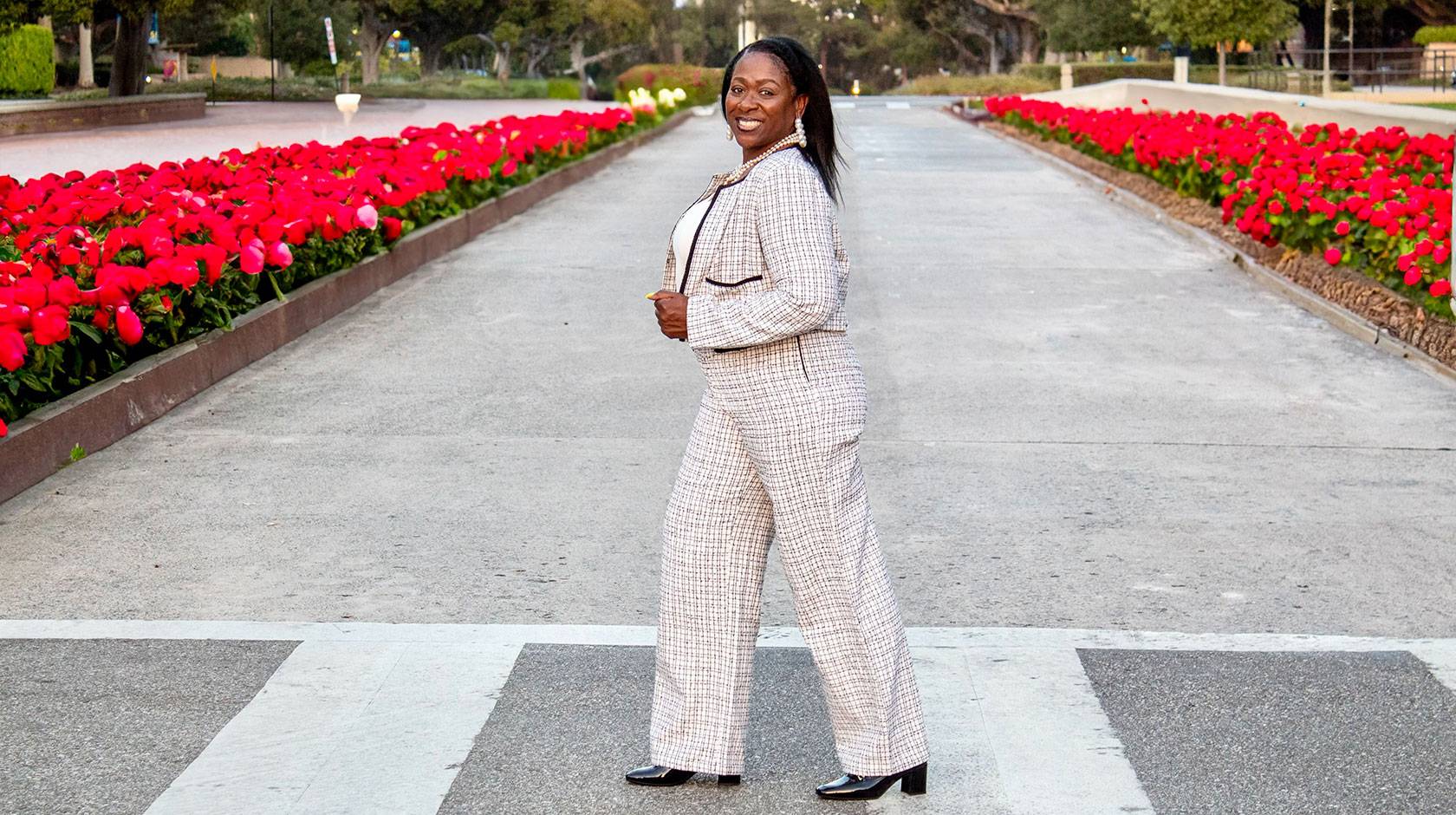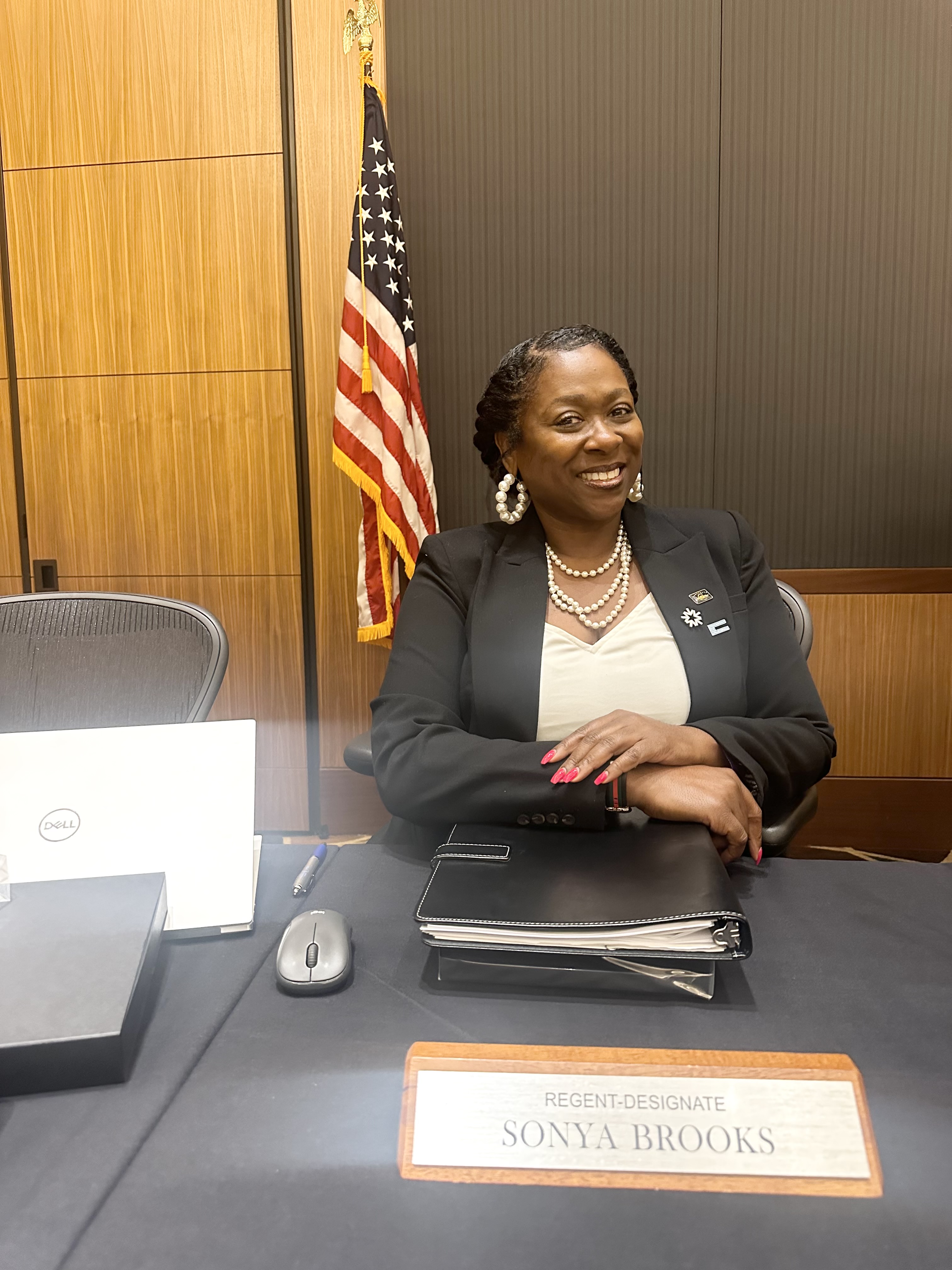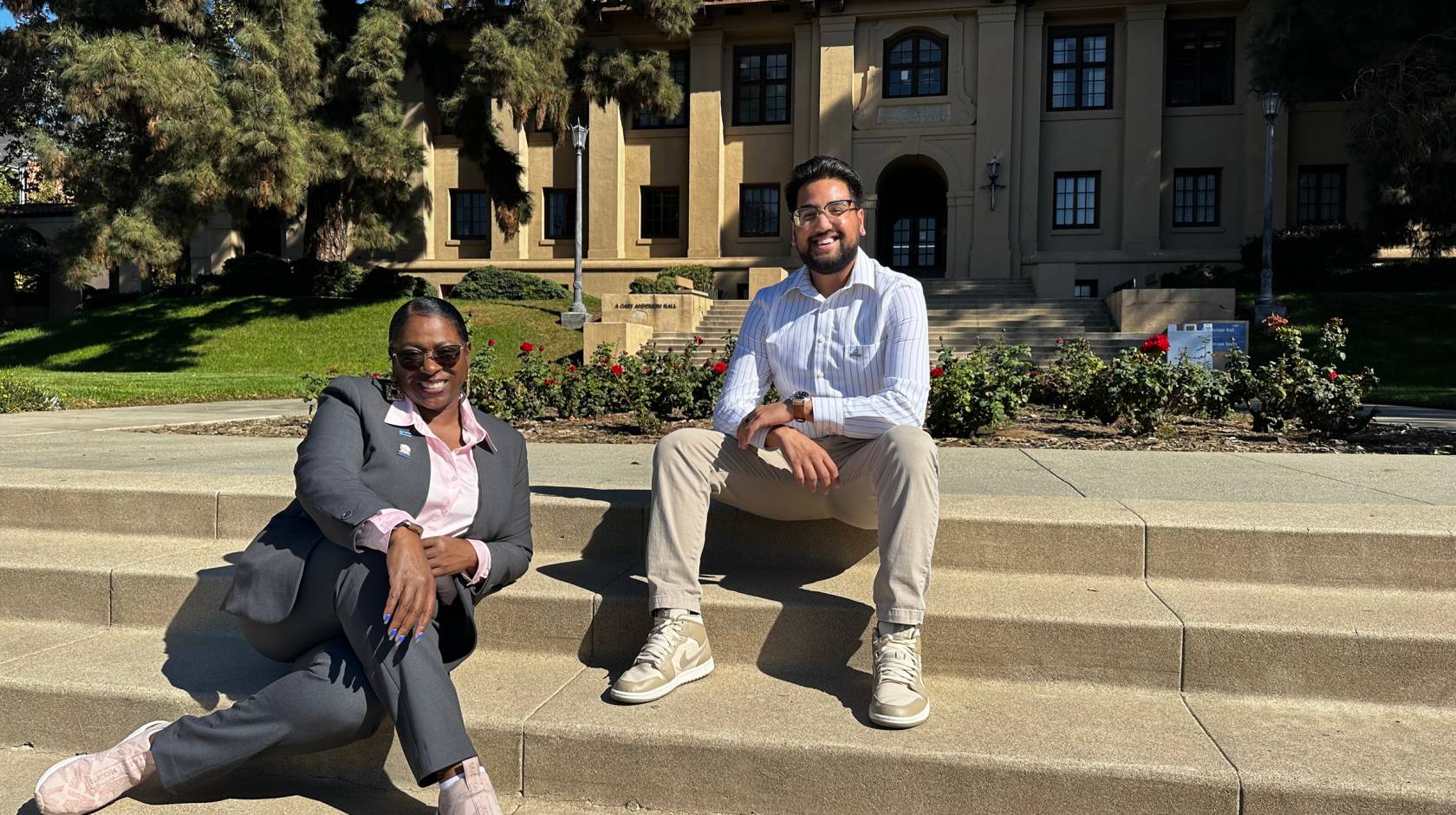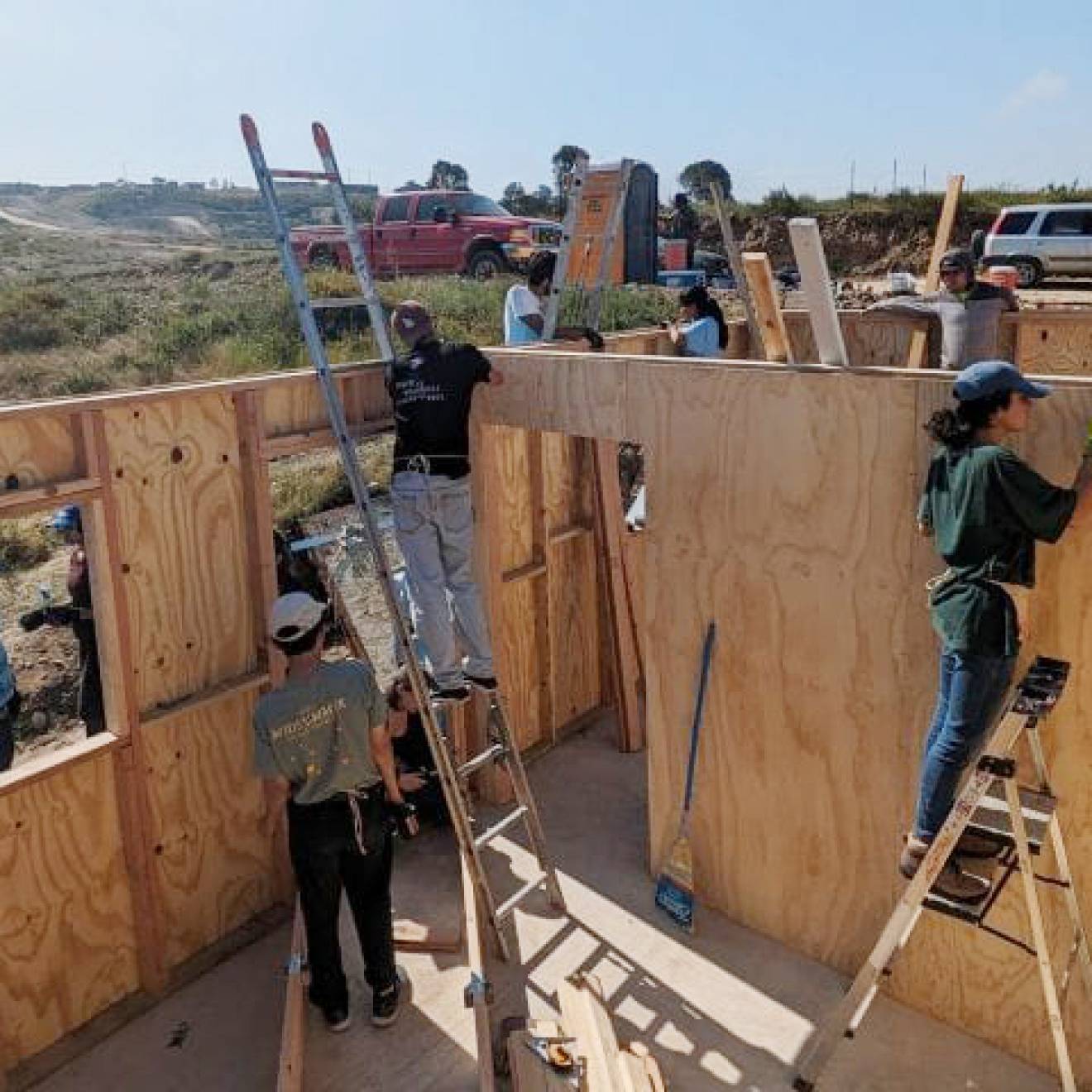Julia Busiek, UC Newsroom

Sonya Brooks is a scholar, a student, a parent, a leader, and, by her own description, loves to talk and listen to people.
“I don’t think you could find a person who loves to talk to people more than I do,” says Brooks, who’s earning her Ph.D. in education and a master’s in community health sciences at UCLA, after graduating from the campus in 2019 with a pair of bachelor’s degrees and earning a master’s from Brown University in 2021. “My children and I can be anywhere and I’ll just start talking to people
What Brooks calls her ability to speak with people, her “ministry,” is only part of what earned her a role as the upcoming UC Student Regent, the sole student voting member of UC’s governing board. She previously served as vice president of external affairs for the UCLA Graduate Student Association and president of UCLA’s Black Graduate Student Association, and on the boards of the UC Graduate & Professional Student Council, UCLA Alumni Association, and the UCLA Black Alumni Association.
When her term as a voting member of the UC Board of Regents begins in July, she’ll be the first Black woman to serve in that role. To learn more about her journey to UC leadership and the kinds of change she’s hoping to make, we caught up with Brooks between volunteer shifts serving meals and distributing toiletries kits to Angelenos affected by the January wildfires.

Sonya Brooks at a UC Regents meeting.
You’re the UC student regent designate, you’ve earned two bachelor’s degrees and a master’s, and now you’re working toward your Ph.D. and another master’s, simultaneously, while raising three kids, directing a couple of nonprofits, and earning several awards for your research … what do you attribute your energy and ability to get involved?
Growing up I developed a keen sense of noticing when things didn’t seem to be right. I would question and be told to stay in a child’s place or it didn’t concern me, but my soul could not rest until I helped those who felt helpless in some way. Seeing my mother cry adultified me before the age of five. I was right on target for the age when Black girls are no longer considered children. My world was literally changed. I went from watching Sesame Street to constantly worrying about what we would eat, where we would live, or if we would be safe.
Growing up in Oakland, what was once called the “murder capital of the country,” carried with it challenges of its own. No child at that age should know what murder, police brutality, drug addiction, or suicide is, but I did, and not by choice.
My community became the quintessential definition of “food apartheid” that included school closures and bussing, and no health clinics or grocery stores. Today, I view this as a death sentence for this population that resulted in chronic diseases and illnesses that ended in death that were preventable. But when I traveled across the freeway just two miles away, I saw parks, perfectly manicured lawns with fluffy dogs, and neighborhoods with grocery stores and farmer’s markets, not liquor stores or racial covenants. Why was this okay and what was the difference between these communities? Well, one could only guess.
This passion grew intensely when my son was suspended from school as a kindergartner for being stabbed in the arm by his classmate. He was the victim and yet he was suspended. When asked if the perpetrator was being suspended, I was told, “No.” The difference between the victim and the perpetrator was color — my son was Black. His perpetrator was not.
How did that experience change your trajectory?
I did not know what was happening, but later, through research and scholarship, I came to learn that the school was trying to usher my son into the school-to-prison pipeline
Seeing the pain and sadness on the faces of my family members who felt they had no voice to change certain situations they were in because of where we were deposited ignited a passion within me to learn how to learn the hidden discourse and the lexicon and how it was being communicated. How can I find a way to translate what was being stated and written about certain populations that justified the treatment I witnessed from an early age?
To me, it became learning about systems that impact certain communities and how policies work and can be changed. This was the way to change certain situations then, and can definitely be the answer now. It was in this way I became a voice for the voiceless.

How did you make your way to studying education?
As a child, when coloring, I never stayed within the lines. I always felt things were going on in the background that needed to be noticed and was a part of the bigger picture. What happened to my son was a smaller part of a bigger picture, a larger truth, so to speak. It would take me delving deeper to see if this was an isolated event or a phenomenon that needed to be addressed immediately.
This is one of the reasons I approach learning from a scenic route. I landed in education because it was the discipline that allowed me to bring to the surface all that I had learned from the law, sociology, anthropology, biology, chemistry, philosophy, and every other “ology” out there that I had studied and created an inclusive and interdisciplinary approach that other moms in my situation could easily follow. The education field is a way for me to be creative, include community phenomenological perspectives, and work collectively to resolve them holistically.
I tell my students who ask how to get involved in advocacy that you don’t have to go looking for issues, as they will come and find you. I didn’t go looking for institutional practices and policies that targeted Black and marginalized students. These issues came looking for me by targeting my son. It was here that my relationship with research began.
Research was not the panacea; however, it became to me what the law is to a lawyer or medicine is to a doctor — a way to delve deeper and learn about systems under our noses that can be unjust to some and beneficial to others. What I aim to do is level the playing field for those often pushed to the margins by the systems created to keep them there. And research is helping me to do just that.
What are some ways you’ve approached these themes in your research?
One participant was suspended from school because she had her head down in class. She had a headache due to hunger and lack of sleep because she cared for her sick mother and younger siblings. What a lot of educators and physicians don't realize is that a lot of these girls, especially Black and brown girls in junior high and high schools, are caregivers of their siblings or other family members, or they are suffering from food insecurity or housing insecurity. But none of these factors play into how or why they are disciplined or if they can receive care in schools.
Another study for which I won a few awards was on the agency enslaved Western African women used when they reclaimed their bodies and intentionally refused to contribute to the institution of slavery. They used ethnobotany and created products they ingested and applied to ensure they would not have offspring born into this heinous and atrocious system of forced labor and torture.
One finding from this study was that African Indigenous people had a robust culture of medicinal knowledge for hundreds of years before colonization. I also found that African women carried seeds of medicinal plants and produce in their cultural hairstyles throughout their capture and enslavement, and then they cultivated these plants when deposited in the Western hemisphere. Also, the knowledge African women possessed regarding their medicines and cures were used in Western medicine, and as a way to thwart people from relying on medicines and cures created by African and Native American Indigenous peoples, colonizers called these cures “hoodoo,” “voodoo,” and “Black magic.”
This study I will build upon in the years to come because I plan to travel to parts of the world I learned about in my research.
Could you tell us a bit about your educational journey?
I was a parent when I was at UCLA right after high school. I completed all of my classes and thought I graduated. I returned to Oakland, got married, and went to work in corporate America. This was when all of those things were happening to my son. I attempted to climb the corporate ladder for better pay to move to a better school district, but could not. Even though I had been successfully covering the managerial position for two years, when it was time to hire permanently for it, I was told I didn’t qualify for it. But I was already doing it.
This was also the reception I received when speaking at the school and district meetings. I quickly learned that even though I was articulate and successful in both the educational and working world, I didn’t have the letters behind my name that justified my responses or actions. The journeys I endured were up a creek and I didn’t have a boat nor a paddle.
So that’s what made me come back. I quit my job, I came back to UCLA and I finished my first bachelor’s, but then I was like, well, I could get another one while I’m here, so I did. After that, I went to Brown University for my first master’s, returned to UCLA to start my Ph.D., and completed a subsequent master’s since I had completed my coursework for my Ph.D., within a year.
You’re going to have so many degrees!
Tell me about it. I’m going to run out of space after my name to list them all.
What are your priorities during your term on the Board of Regents?
One of my priorities is to integrate graduate students into the UC equation. Right now the focus is heavily on undergraduates — as it should be, and I get it. But graduate students are the backbone of the institution. We're researchers, teachers, counselors, and confidants. So in every conversation I have, my first question is, What is the data for graduate students? If we don’t have data for graduate students, how can the UC system make informed decisions about the entire student population?
I’m also trying to promote academic equity and housing equity. If a student is placed on academic probation or subject to dismissal, are their basic needs factored into what happens next? What is their housing status? Do they have food? Are they a student with dependents? Are they disabled? What about any medical issues? These are questions that should be a part of the conversation from the beginning. No student should be prevented from obtaining an education because their basic needs are not met. I am working to make academic equity a system-wide policy to ensure we are meeting the needs of our students so they are successful in their journey.
Another priority for me is to add to the current sustainability policy by adding an amendment to include a policy to prevent food waste. Our systems are effective and impactful; however, they can be improved. We need to ensure that the restaurants, cafeterias, and other food suppliers on our campuses do not add to one of the problems from which America suffers — food waste. To help with food shortage on our campuses, we can get packaged and uneaten foodstuffs to the student communities that need them most — marginalized students, students with dependents, and students with disabilities. This should be built into and financially provided for in the framework of basic needs and sustainability.
There are quite a few more but I’ll save them for now.
It’s your job to represent the interests and perspectives of all UC students on the UC Board of Regents. How do you know what those interests and perspectives are?
One thing I learned from being a researcher is to consider my positionality. I never want to assume that what I think is important is important to 300,000 students, right? So I have office hours where people can walk in and tell me what’s on their mind. I give everyone my phone number and email address so they can contact me. I attend student groups and committee meetings so I can meet students where they are and hear their concerns, which can be good, bad, or ugly.
This was very important to me, so much so that when I came to the Regents, I changed the campus visit objectives a bit. I didn’t want the campus visits to only be about recruiting for the next student regent. Instead, I wanted to meet with the student groups, affinity groups, and student government groups to hear from them. These visits are a real opportunity to meet some of the 300,000 students I am supposed to represent. In the last 7 months, I have already exhausted two boxes of business cards and am on my third. I guess I’m doing okay, huh?
Is your role as a student regent preparing you for any future career moves after your Ph.D.?
You know, people ask me that. And I'm like, if this is a stepping-stone to a career, I wish someone would tell me which one because I’m not even sure what I’m going to do after I graduate.
Right now, I just know I’m here to serve the UC student body. I’m part of the UC family network that reaches around the world. Wherever I go, I can always find someone tied to UC somehow. That is a remarkable statement to make.
Being the first Black woman selected as the Student Regent in its 50-year history is definitely something to be thankful for. However, my job is to make sure I am not the last. I do know that all of my life choices and decisions led me here, which is scary to say because I have made some doozies. My experiences as a single mom suffering from housing and food insecurity, disparate treatment, and so many other life challenges allow me to advocate from a first-hand account and level of sensitivity that is personal and real.
l would always look for someone to come and save me when I was at my lowest, thinking that was the right thing to do. And then I realized that they would be there on the 35th of Neverary. There was no one coming. However, I learned that I had everything in me that was needed to bring my family out of poverty and hunger because there was no way I could sit back and watch them continue what seemed like a generational curse.
The tenacity, acumen, intelligence, and knowledge I already possessed in my DNA and it just needed good fertilizer to grow, to come out, to prosper. For me, that fertilizer was the unconditional love of my three children that shone for me every day and every night, even when I didn’t feel deserving. They call me their “shero” to this day. So in a sense, I became the shero I was waiting for. Ultimately, I am doing what I was created to do, not expected to do.

